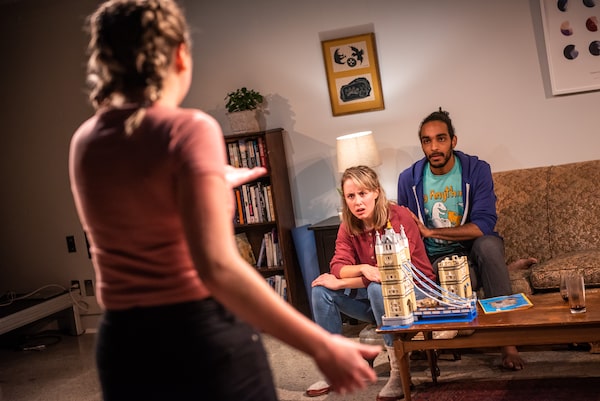What I Call Her
Written by: Ellie Moon
Directed by: Sarah Kitz
Starring: Michael Ayres, Charlie Gould, Ellie Ellwand
Presented by: Crow’s Theatre

From left, Ellie Ellwand, Charlie Gould and Michael Ayres in the play What I Call Her.Dahlia Katz
Ellie Moon’s 2017 Asking for It, a verbatim play about consent, was a questing work of art, often agonizing to sit through, but ultimately thought-provoking and rewarding theatre. Her new play, What I Call Her, which opened this week at Toronto’s Crow’s Theatre, takes anti-pleasure as a theatrical experience a step further.
You might call the play something between insufferable and incredible. There’s a good argument to be made that its relentless, high-octane emotion lands it closer to the former extreme. But then the psychological depth wrought from this unbearableness has a magnetic pull. And the way this intensity manipulates our understanding of the material, not to mention how it plays upon our sympathies, is the mark of some serious art.
The 90-minute play is set in the Leslieville apartment of 25-year-old Kate (Charlie Gould) and her boyfriend Kyle (Michael Ayres). Kate’s estranged mother is in a hospice, dying of cancer, and Kate is figuring out how to process her imminent death. She references ongoing childhood physical and verbal abuse and speaks of the immense relief she will feel at the news that her mother is dead. She’s tormented by the discord between the public’s perception of her mother, who ran an organization for survivors of sexual abuse and was respected by her community, and what happened at home. As a cathartic exercise, she decides to write a tell-all obituary as a Facebook post.
Then Ruby (Ellie Ellwand), Kate’s younger sister, knocks on the door. Ruby and Kate are also estranged on account of their different perceptions of their childhood. Ruby has no memory of abuse and has been struggling to care for their enfeebled mother while studying at McGill. Heartbroken and exhausted, she paints a very different family portrait that centres on an angry, self-serving older sister who has inflated a little childhood friction and effectively ripped the family apart. In Ruby’s worldview, Kate is a monster incapable of forgiveness. We’ve seen for ourselves how single-minded and self-absorbed Kate can be. Interrupting her boyfriend as she paces maniacally around her living room, she calls herself, unsurprisingly, “difficult” and “hyperbolic.” Later, when Ruby provokes her, Kate’s retaliation is frighteningly extreme.
The play is too long, and the first section, depicting a young couple at home, feels busy and stilted. There’s a heavy-handed focus on the Facebook post, and a need for more convincing intimacy between Kyle and Kate. But as the action develops, what Moon and director Sarah Kitz are able to do with the psychology of trauma and conflicting family narratives is remarkable. The circularity of both sister’s arguments, how their entire understanding of their lives is based on opposing facts and how inexorably this has shaped their personalities, is astonishingly real. Moon makes the pain brutal and the love more brutal still. The final scene, performed in silence, is simple and achingly lovely.
As a young woman overwhelmed by her first taste of tragedy, Ellwand is excellent, bringing unaffected strength and candour to Ruby. Gould is a slower burn as Kate. The role’s stubborn, high-strung intensity can seem overcharged at first, but, ultimately, I found myself deeply impressed by the rigour of this character study. This was due, in part, to the boldness and intelligence of Moon’s writing. She refuses to soften Kate’s edges and her ability to create such a complex, fleshed-out and empathetic character while maintaining this inveterate hardness is a showcase of noteworthy skill.
The real marvel here might be how good Moon is at getting under our skin. Her writing demands a kind of interpolation, i.e., a projection of one’s self into the conflict. Your own experience of family discord and alternative histories might well determine how much you’re able to question the veracity of Kate’s account. “Believing Kate” might seem like metonymy for #BelieveWomen, but here it’s complicated by the fact that every stakeholder in the story is female and you might struggle to believe them all at once.
What I Call Her continues at Crow’s Theatre until Dec. 8